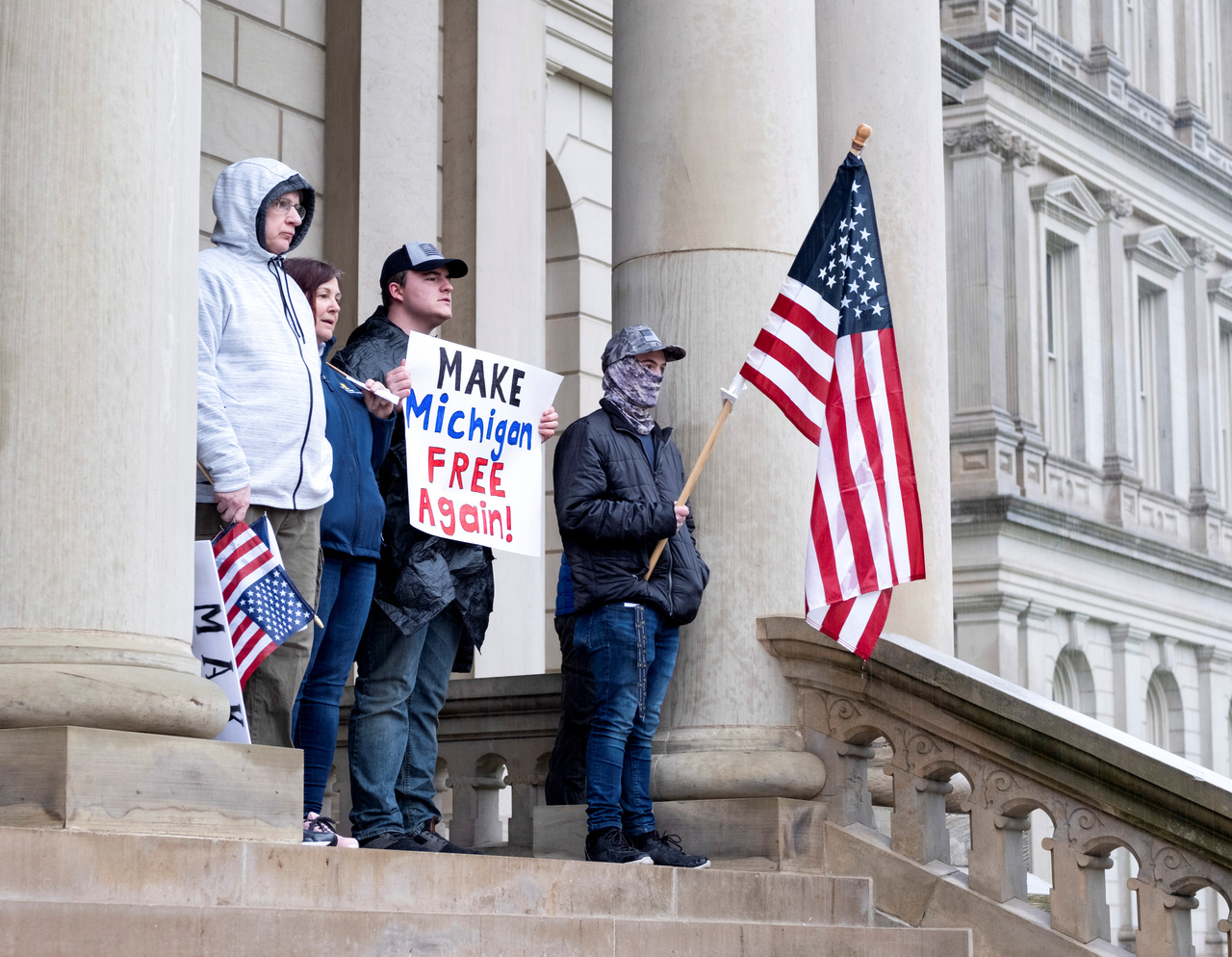Coronavirus: Republican, Democratic states in US hold splitting views on reopening
Sign up now: Get ST's newsletters delivered to your inbox

Protesters at the Capitol building in Lansing, Michigan, on May 14, 2020.
PHOTO: REUTERS
WASHINGTON - With frustration in his voice, Kentucky senator Rand Paul berated infectious diseases expert Anthony Fauci, arguing at a Senate hearing on Tuesday (May 12) that a national strategy of keeping schools closed to curb the spread of the coronavirus was misguided.
"In rural states, we never really reached any sort of pandemic levels in Kentucky and other states.
"We have less deaths in Kentucky than we have in an average flu season. It's not to say this isn't deadly, but really outside of New England, we've had a relatively benign course nationwide," said Mr Paul, a Republican who himself recovered from Covid-19 last month.
The heated exchange underscored how Republican and Democratic states are experiencing the coronavirus differently, which experts say in part explains why red states are more eager to reopen businesses and schools.
The virus first spread rapidly in Democratic states on both coasts, including Washington, California and New York.
America now has nearly 1.5 million recorded cases and 87,000 deaths, the lion's share of which can be found in a handful of states in the northeastern New England region.
But closing businesses to contain the virus has hit all states hard, with unemployment numbers surging everywhere.
"A red state governor is losing his business in exchange for blue state lives.
"So for him, opening up is a no-brainer, which is sort of why it's happening," said Nobel Prize-winning economist Angus Deaton on Tuesday at a Brookings Institution talk on reopening America's economy.
"It's a lot to ask those governors to kill their businesses and their GDP (gross domestic product) for people who live far away, and whom they may not even like very much," added Prof Deaton, of Princeton University.
The political differences are colouring the debate on when to reopen.
On one end of the spectrum are Democrats who argue that states which reopen too early risk fresh spikes in infections and deaths, and on the other end, Republicans who say that the economic destruction caused by continued closures is too much to bear.
Recent polls also show that while Americans of both parties worry that reopening the economy now is not beneficial as it will result in more deaths, Republicans are more likely to be okay with an immediate opening.
An ABC-Ipsos poll released last Friday shows 92 per cent of Democrats opposing an immediate reopening, compared to 35 per cent of Republicans who feel the same.
The White House has left decisions on when to reopen up to state and local officials, and more than half of the states have started to reopen their economies.
But only two states - Kentucky and North Dakota, both Republican states - actually meet the White House-recommended criteria of declining infections and deaths, according to a Covid Exit Strategy, a group of public health experts tracking reopenings.
The political divide is also fuelling a growing clash between red and blue states on how much coronavirus aid Congress should grant struggling states and local governments.
The areas in most need of coronavirus aid are by and large blue, but some Republicans are reluctant to bail out Democratic areas, which they accuse of being poorly financially managed.
For instance, the New York Times reported that Republican senator Rick Scott of Florida arrived at a party gathering last week bearing a placard that showed the rosiness of his state's finances compared to the Democratic states of New York, Illinois and California.
But Covid-19 is steadily creeping into red states, according to weekly analyses of case patterns by Brookings Institution senior fellow William Frey.
On Thursday, he wrote that for the third straight week, counties newly designated with a high Covid-19 prevalence were home to more voters for President Donald Trump than voters for Hillary Clinton in the 2016 election.
These areas were concentrated in smaller and non-city areas in the South and Midwest, with a larger proportion of white residents than ever before, he added.
Wrote Dr Frey: "This suggests that, despite recent protests and polling, debates over reopening the economy could turn out to be far more nuanced than a simple red America versus blue America disagreement.
Said Prof Deaton: "It's clear that as deaths move into red states, there'll be less political difficulty about helping states in trouble, and there'll be greater consensus for a smart opening."


